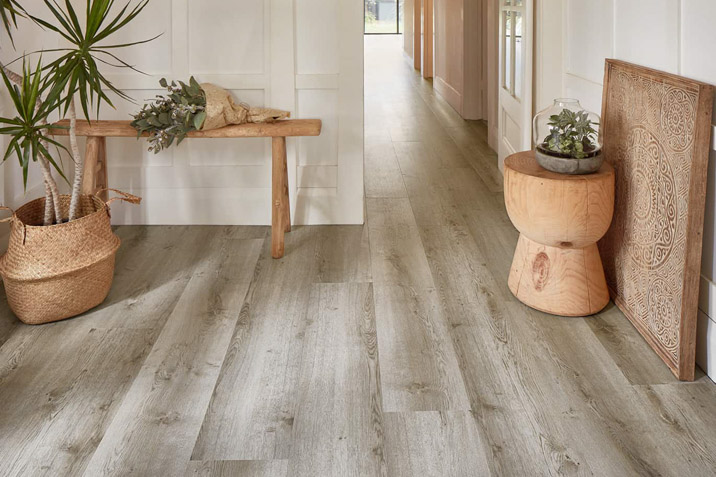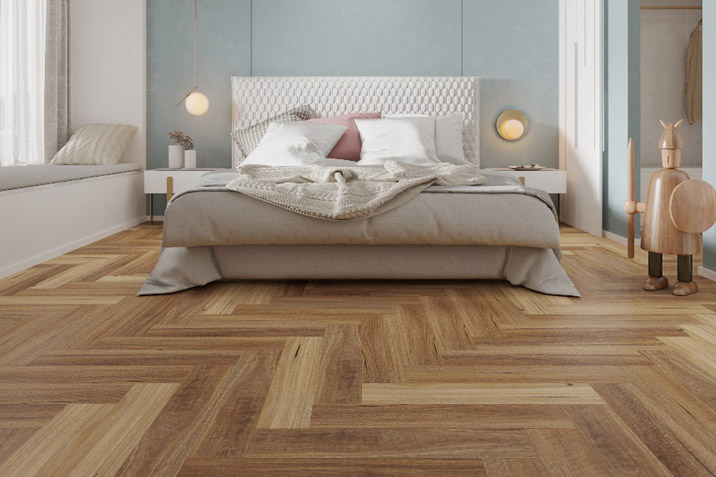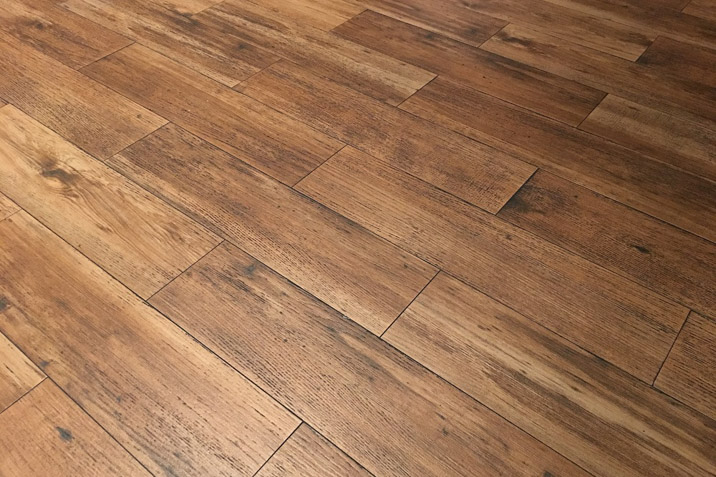What is hybrid flooring?
Hybrid flooring is an innovative new flooring option that is composed of multiple blended materials, hence its name. These mixed materials are usually some combination of plastic, limestone and/or wood. Hybrid flooring entered the market in 2019 and has been steadily rising in popularity ever since. Hybrid flooring is durable, waterproof, affordable and fashionable, setting it among the best flooring options and potentially even surpassing traditional timber. It is sometimes referred to as hybrid vinyl flooring or hybrid laminate flooring.

What is hybrid flooring made of?
Hybrid flooring is made of plastic mixed with wood or limestone and pressed tightly together into multiple layers. The layers of hybrid floors are as follows:
- UV coating / protective layer (wear/scratch resistant)
- Aesthetic layer (usually stamped to mimic a real timber floor)
- Core layer (resistant to water/temperature changes/warping)
- Pre-adhered layer (backing – ease of installation and adds underfoot comfort)

Hybrid flooring pros and cons
There are numerous benefits to choosing hybrid flooring as opposed to the alternatives. Here are some of the best aspects of hybrid flooring.
1. Durability
Hybrid floors are resistant to the wear of high foot traffic and are therefore ideal for residential or commercial usage. Hybrid flooring is often understood to combine the benefits of laminate and luxury vinyl, as it has the strength of laminate paired with the aesthetic appeal of luxury vinyl planks. It is 100% waterproof and temperature resistant. Though it has a fair level of scratch resistance, it will scratch under duress and you should take steps to ensure that your hybrid floors are well taken-care of to prevent this (i.e. cleaning/vacuuming, placement of furniture/felt pads for movement across floors etc.).
2. Installation
Hybrid flooring is pre-adhered and therefore can be installed without nails or glue over the top of the underlayment, “floating” above the subfloor. This makes the installation process extremely quick and easy, and also means that individual planks can be removed, repaired or replaced as necessary. Overall, the installation and maintenance of hybrid floors is unprecedented in its simplicity.
3.Cleaning
Hybrid floors, like all floors, require some semblance of routine cleaning to keep them at their best. How to clean hybrid floors effectively will involve fairly regular sweep/vacuuming as well as a weekly wash/mop with water to clean any dirt tracked in on foot throughout the week. Because hybrid floors are 100% waterproof, washing them with water is even easier than washing traditional timber floors as there is no need to worry about excess water seepage.
4. Affordability
Hybrid floors are more affordable than timber or engineered flooring, as well as more sustainable as they require less of the materials with a high carbon footprint, such as slow-growing timbers like oak. The simplicity of their installation makes them easily one of the cheapest flooring options in the short term – saving on labor costs, materials etc. – and in the long term as repairs can be localized to the individual planks of concern.

There are, of course, some disadvantages to hybrid flooring. The most prominent cons to hybrid flooring are as follows;
1. Inauthenticity
The cheaper the brand of hybrid floor that you purchase, the less like real timber it will look. This is because the aesthetic layer of the floors is essentially printed on, so cheap floorboards will repeat the same pattern often enough to be noticeably fake. Hybrid floors lack the visual diversity of real timber floors, and this can impact their aesthetic appeal. However, the better the brand of hybrid flooring, the more authentic it will look. Have a look at the Titan range or peruse Bunnings’ online product catalogue to read some reviews and get a sense of the best hybrid flooring brands.
2. Discolouration
Despite being fade-resistant, hybrid floors have been known to fade after prolonged exposure to direct sunlight. This can be prevented with curtains/blinds. Extended contact with some rubber products can also cause discolouration in the long term; it is a good idea to choose furniture/décor with this in mind.
3. Sub-floor requirements
If the subfloor deviates by more than 3mm/2m it is highly likely that hybrid floors will be difficult to install and prone to creaking. This challenge is not unique to hybrid flooring however, as an uneven subfloor will pose challenges for all major types of hard floor materials (especially timber). However, floating floors like hybrid flooring will raise the height of your floor overall – you should measure the thickness of the planks against your walls before purchasing and make sure that the change will not feel too drastic/claustrophobic, depending on the height of your home’s ceilings.
Hybrid flooring ideas: Top 5

Hybrid flooring comes in a range of colours and styles. Some of the best are outlined below.
3. Slate gray

Adding a level of contemporary sophistication to a room, gray hybrid floors have an understated elegance which allows for the room’s décor to truly shine. They come in varying shades and samples are often free. The price of slate gray flooring does not differ from the average price of hybrid flooring in general, sitting at around $35-60 per square metre. You can find multiple shades of quality slate grey hybrid flooring online in the Floorworld hybrid flooring options. Floorworld also has multiple locations arcoss Australia, including stores in Melbourne, Adelaide, Hobart and the Gold Coast, if you would prefer to browse in-person.

2. Patterned
The most common layout pattern for hybrid flooring is probably staggered.

However, other patterns are available for a slightly higher price, and they give these hybrid floors a sense of personality. Some of the most beautiful and intriguing patterns are;
A) Herringbone

A herringbone pattern adds a sense of classic romanticism to the floor, turning it from a neutral background into one of the standout features of the room. Purchase some beautiful herringbone patterned luxury hybrid flooring here.

B) Diagonal

A diagonal pattern is a very modern and industrialist look which brings the room into the 21st century. Using a diagonal pattern for your hybrid floor will imbue your room with contemporary elegance, and you could even do this in multiple colours if wished – perhaps slate grey could be a strong contender here.

1. Natural
Though there are many beautiful options available, nothing quite beats the aesthetic appeal of a natural timber look. Quick Step has an extensive list of light and dark natural wood styles, with samples available for free. They also have a network of suppliers across Australia, including Touch of Class Flooring in Perth and Choices Flooring Fortitude Valley in Brisbane. In particular, their light natural wood has a grace and softening neutrality to it which allows for the design of the room to shine.


Contrastingly, darker natural woods add intrigue and a sense of mystery, commanding attention. They are a bold choice which is becoming more popular as contemporary trends focus more on expressing personality through design choices. See Mr Timber for more hybrid flooring, specializing in a dark natural finish.

Hybrid flooring vs laminate
Either option will work well in your home and you should consider the specifics of your project – such as size, budget, time-frame and geographic context – before making a decision. In general, laminate will cost less than hybrid flooring (though both are among the cheapest flooring materials available) and it has a slightly easier installation process. However, laminate is not as waterproof and therefore its durability is limited because it will likely require maintenance in the future. Hybrid flooring is also slightly more comfortable underfoot as it is slightly softer.

